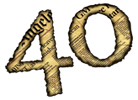EPISODE 4: THE SIGN OF JONAH
Is the warehouse an ark, carrying the Survivors across turbulent waters? Is it a way-station, offering only temporary comfort? Or is it a launching place, a pier?
Lent is a journey. As pilgrims, struggling to find our way across the desert, we must be careful not to be seduced by the occasional comfort or shelter that comes our way. We must not convince ourselves that this place will suffice, that this bit of warmth or security is the destination. Christ calls to us from across the wilderness; just as Christ wanders beside us, leading us toward the new life of Easter.
For the people finding shelter in the warehouse, perhaps the Lady in the Street represents the transience of their situation. Perhaps she is a threat to the illusion of safety that some of them have so carefully constructed.
EPISODE 4 REFLECTIONS SET 1

Owen envisions the Lady in the Street as a type of Jonah, awash in a turbulent sea and swallowed by a great fish. This might be a good time to recall how Jonah wound up in the belly of that fish.
God tells Jonah to go to the evil city of Nineveh and warn its people of their impending destruction. Jonah doesn’t want to do what God asks, so he hurries to the docks and sneaks onto a boat, figuring that God will just leave him alone. But God is relentless; he hurls a terrifying storm at the ship. Curled up in the hull, Jonah sleeps through the storm until the frightened crew discovers him. Jonah concedes that he’s to blame for their predicament because God is hounding him, personally. Jonah offers to be thrown overboard, the sailors take Jonah up on the deal, and the storm stops immediately. The joyful crew thanks God, but meanwhile, poor Jonah is drowning. But God doesn’t abandon Jonah. He orders a sea monster to save Jonah by swallowing him whole. The sea monster, the only character in the story– at least so far—who does what God asks, keeps Jonah alive for three whole days before depositing him on a beach, safe and sound.




EPISODE 4 REFLECTIONS SET 2

Jonah’s story echoes backwards to the drama of Noah and the Flood, and forwards to Christ’s passion, death and Resurrection.
Surely Jonah is one of the most unwilling prophets in Scripture. Yet God chooses to work through him, despite his lack of enthusiasm, peevishness and self-pity. In fact, it is through this reluctant, whining man that God restates his Covenant, that promise of special steadfastness he made to Noah after the Flood.
Jonah’s obedience is crucial to God’s desire– which is why God hounds the fellow so relentlessly. It’s not until Jonah finally obeys God and goes to Nineveh that the story moves forward.
Jonah is infuriated when God spares Nineveh. Jonah suspected all along that, in the end, God, being merciful, wouldn’t wipe out an entire city. Jonah sees himself as the victim in this story. He charges God with harassment by forcing him into undertake what he knew to be a fool’s mission. Daring God to just kill him and get it over with, Jonah sits in the sand and pouts.
Of course, in a very real sense Jonah is just a messenger. But of what? Is the message nothing but a proclamation of coming annihilation? If so, why bother with an announcement? Jonah’s message—the Sign of Jonah– is God’s invitation to change.
The people of Nineveh hear this invitation, take it to heart, and act on it.
It’s not sorrow or the extravagance of their penance– even the livestock wears sackcloth and ashes—that saves them. It is the changes that they make.
When God saw what they did and how they turned from their evil ways, he relented.
God wants more from us than sorrow and penance. He wants conversion. He wants metanoia. He wants change. It is change that gives meaning to any Lenten penance or sacrifice. It is change that opens the way to the Resurrection.



















